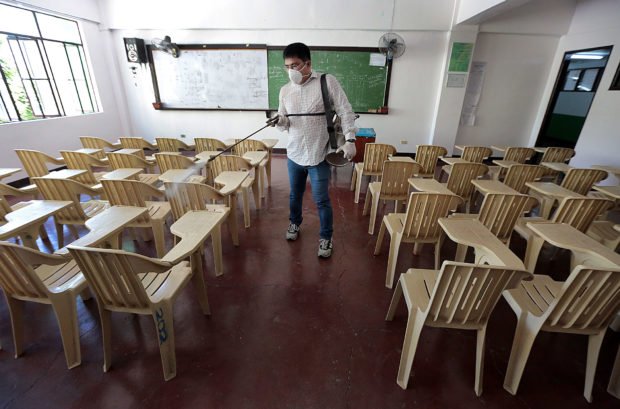CEBU CITY, Philippines—The Department of Education in Central Visayas (DepEd-7) said it is in favor of allowing the implementation of face-to-face classes but only with a limited number of students and starting in areas with low risk of COVID-19.
Earlier, the League of Municipalities in the Philippines (LMP) – Cebu Chapter submitted a resolution to the National Inter-Agency Task Force (IATF), urging President Rodrigo Duterte to consider the implementation of the limited face-to-face classes.
DepEd-7 regional director Dr. Salustiano Jimenez revealed that the proposal originally came from him, which he submitted to the regional IATF and was endorsed favorably to the national level.
He said that the proposal was made after he received more than 160 resolutions from the Parent-Teachers Associations (PTAs) and Local Government Units (LGUs) suggesting for the implementation of the limited face-to-face classes.
“And because of that, I talked with our superintendents, I had a meeting with them. Then after meeting with them, I came up with a proposal and then I presented it to the regional IATF. Now, the regional IATF, after my proposal, endorsed it favorably through resolution no. 50 series of 2020,” Jimenez said.
He added that in their proposal, the limited face-to-face classes will be prioritized to areas with zero cases or low-risk of the Coronavirus Disease 2019 (COVID)-19. They will also prioritize around 1,000 schools in mountain and island barangays.
Aside from this, Jimenez said that there are certain criteria that schools should meet, such as its population, wherein only 50 percent of the classroom capacity is allowed, and the preparedness of schools in implementing the health and safety protocols.
The agency also plans to schedule the face-to-face classes for at least twice a week, while the remaining days will be dedicated to other school activities and assignments.
“My instruction was very clear to all our superintendents that if ever there will be a limited face-to-face (classes allowed), we will start with the hinterland schools and also island schools. [Aside from the fact] that the population is small, which Is very easy to implement the social distancing and the health and safety protocols set by the Department of Health and IATF, they are also easier to control,” he added.
He said that this will also help parents to ease their task in monitoring their children with their modules and lessons, especially those who are busy with tending to their livelihood.
Jimenez admitted that as of the moment, students in basic education in the country are still dependent on their teachers in the learning process.
Jimenez added that if the President will approve the resolution, they will implement immediately the limited face-to-face classes set-up.
/bmjo
